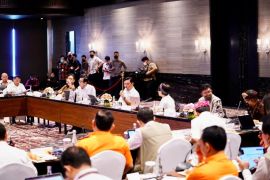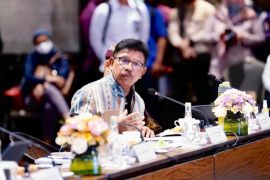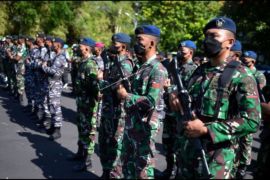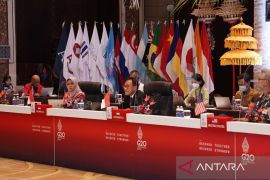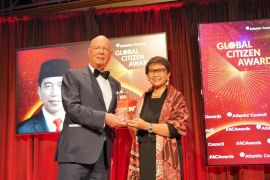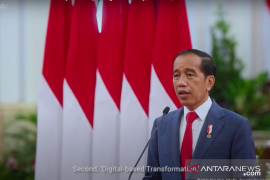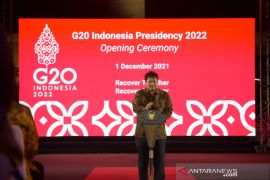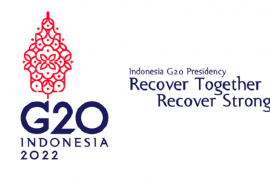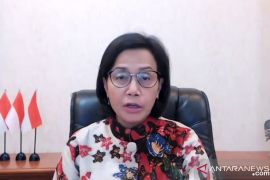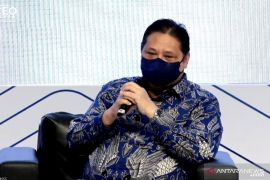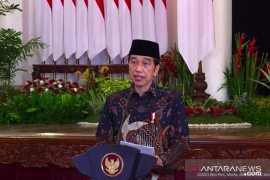Members of the forum are home to 60 percent of the global population and contribute to 75 percent of the international trade.
Hence, it has a huge influence on the global economy, trade, and investment.
The G20 works closely with various international organizations to formulate concrete policies and actions to address various global economic challenges.
Indonesia officially assumed the G20 Presidency on December 1, 2021.
Related news: Electric vehicles at G20 Summit to encourage alternative energy
In addition to managing the unfinished agendas of the previous presidencies, Indonesia has a huge responsibility to design and formulate a global recovery roadmap.
President Joko Widodo (Jokowi) and his staff are determined to help the international community revive from the health crisis caused by the COVID-19 pandemic.
Taking into account the fact that several countries are still lagging behind in handling the pandemic, equitable recovery for all countries -- especially the developing and poor ones -- is the main goal of Indonesia’s G20 Presidency.
Thus, Indonesia encourages all G20 members to synergize in formulating various policies to restore the global economic, social, political, and health sectors.
Themed "Recover Together, Recover Stronger," the 2022 G20 discussion will be focused on helping the global community to recover together from the pandemic, build a more resilient and sustainable economy, as well as invest for a better future.
Related news: Indonesia must use G20 position to bolster labor sector: ministry
Three focuses
As chairman of the 2022 G20, Indonesia will focus on three strategic issues: inclusive health care, digital-based economic transformation, and sustainable energy transition.
Inclusive health care will be realized by transforming the global health system and increasing the vaccines and medical equipment production to meet the needs of all countries, especially poor ones.
According to the World Health Organization's (WHO’s) data, as of February 1, 2022, around 60.2 percent of the total population in high income countries -- or 861,274,311 recipients out of the total population of 1,430,818,160 -- have been fully vaccinated.
Meanwhile, the second dose vaccination coverage in low-income countries have only reached 4.7 percent, or 41,783,904 recipients, out of the total population of 889,488,236.
The realization is not in accordance with WHO’s target of 40-percent total population coverage by the end of 2021 for countries in terms of the administration of the second dose of vaccination.
Hence, Indonesia is assisted by the World Bank and WHO to build a global health fund mechanism and collaborate with big international companies to prepare vaccines and drug funding access.
Related news: Labour20 urged to help tackle poverty, unemployment
The Indonesian presidency will also attempt to harmonize global health protocol standards as well as to develop global manufacturing and knowledge centers to prevent, prepare, and respond to future health crises.
Meanwhile, digital economy transformation will be implemented by formulating policies that are able to create added value for digitalization development.
The attempt aims to support more inclusive and faster economic recovery of the sector, heavily impacted by the pandemic, by digitizing micro, small, and medium enterprises (MSMEs) as well as expediting financial inclusion.
Indonesian Communication and Informatics Ministry has also readied to hold a Digital Transformation Expo at the 2022 G20 Digital Economy Working Group (DEWG) event to provide clearer and more structured mandates regarding digital issues for G20 members.
The working group will discuss three priority issues: post-pandemic recovery and connectivity, digital literacy and data skills, as well as trusted free cross-border data flow.
In addition, the 2022 G20 will focus on energy transition by encouraging priority planning to expedite the use of eco-friendly energy sources, such as Indonesia’s pilot project of replacing coal used in power plants with renewable energy.
Indonesia also becomes the first country to implement carbon tax in 2022 to encourage economic sectors to achieve net zero emissions.
Related news: Indef highlights private sector's role in green economy development
Exit strategy
The goal of Indonesia’s 2022 G20 Presidency is to establish an exit strategy out of the COVID-19 pandemic.
Nonetheless, the policy will be implemented gradually, so it will align with the current implemented recovery policies.
According to the International Monetary Fund (IMF), global economic recovery is going slow due to several obstacles, including inflation, supply side risk, unstable production, and threats of climate change, which are assessed to greatly influence future economic growth.
Hence, Governor of Bank Indonesia Perry Warjiyo has noted that if the exit strategy is implemented hastily, it will disrupt the ongoing recovery process.
However, if the policy implementation is too late, it would hamper stability of the medium- and long-term financial system.
Thus, the exit strategy must be planned well and communicated properly, especially to the economic actors.
Furthermore, the policy should focus on the workforce sector that is also disrupted by the pandemic despite an increasing demand for human resources in the field of information technology.
Related news: Jakarta, W Java governors discuss preparations for Youth 20 Summit
Benefits for Indonesia
Indonesia can only hold the presidency once in every 20 years.
Thus, the 2022 G20 Presidency must be utilized well to revive the nation’s economy since by being the chairman of the international forum, Indonesia can direct the discussion agenda of the forum to have a positive impact on the country’s recovery.
Furthermore, thousands of Indonesians will be involved in organizing various G20 events that can potentially improve the economy of the hosting regions, as Indonesia’s 2022 G20 Presidency will be held in numerous cities and districts across the country.
Around 127 meetings will take place before the G20 Summit in October 2022.
A study conducted by the Coordinating Ministry for Economic Affairs and the University of Indonesia found that the international events can open 33 thousand job opportunities.
Related news: Indonesia encourages ASEAN to support G20 agenda
In addition, the events are expected to increase the nation’s GDP to Rp7.43 trillion and to offer other economic benefits 1.5 folds higher as compared to the implementation of the 2018 IMF-World Bank Annual Meeting in Bali.
Indonesia’s appointment to lead the G20 presidency becomes a recognition of its status as one of the world’s largest economies that is capable of representing other developing countries.
In addition, it is an opportunity to showcase Indonesia's leadership capability regarding international diplomacy and regional economy since Indonesia is the only ASEAN member country that also becomes a G20 member.
The global community's attention will be on Indonesia, especially the economic and financial actors. Hence, the momentum can be utilized to showcase the progress achieved by Indonesia.
The presidency can also promote Indonesian tourism and prominent products to the world as well as become the starting point to restore the domestic and global economic actors’ trust in the country.
Related news: How Indonesia can accelerate the sustainable energy transition at G20
Related news: Indonesia's steps suggested at G20 forum are on right track
Editor: Fardah Assegaf
Copyright © ANTARA 2022


